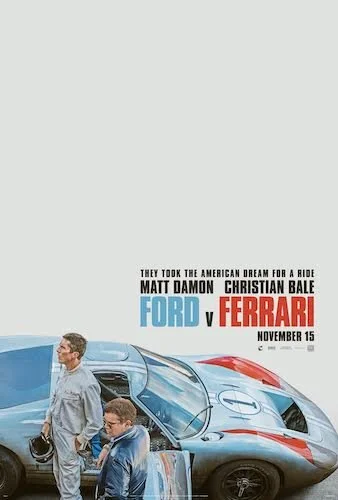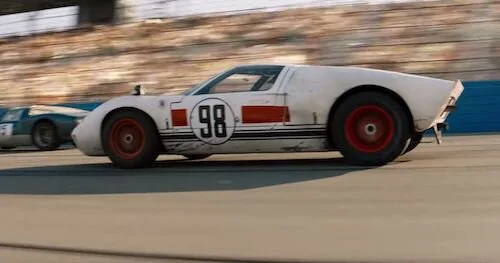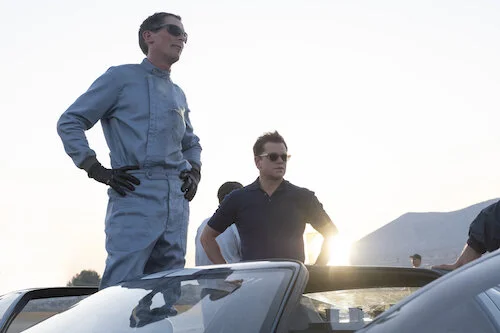Ford v Ferrari
Editor’s Warning: This is a review of a film shown at the Toronto International Film Festival. There is a chance that this film will not be accessible for a specific period of time, depending on the film’s release date. Be aware that there may be slight spoilers. Proceed at your own discretion.
Oh how little interest I held before watching Ford v Ferrari, the latest by Spielberg 2.0 James Mangold. I still watched the film at TIFF to try and start the awards races off super early (this film has Academy Award Nominee written all over it). The first hour of the film, I felt dead wrong about my presumptions. Ford v Ferrari is the Spotlight or The Big Short of auto racing: a screenplay so full of mechanics lingo, and yet I felt like I was learning more than I was missing out. After the film, I stared at the dashboard of my car and pondered "Wow. I've never been anywhere near 7000 revolutions per minute. I cannot even fathom what that feels like". I love a film that is so sure of the industry it will display for the next few hours. I know zilch about cars, period. I still felt like I could soak in this screen play, and even understand every second.
The film is surprisingly shot fantastically well, and I would argue it is one of the better shot films of 2019. Imagine that. Every frame looks like its own retro postcard; all that's missing is the "Welcome to Detroit: The Motor City!!!!" text. All of the rich '60s colours can almost be tasted, yet this does not feel like a film that's meant to feel like a '60s film. On top of that, we have exhibits A and B for the sure fire winners of the Best Sound Mixing and Editing awards next year. The racing scenes are stuffed with every engine that has ever roared. Even the regular sit-down scenes are well crafted, like a carpenter detailing his greatest dollhouse after work hours. Everything here is stitched with love. Even if the film was obnoxiously pedestrian, you'd feel respected as a viewer.
The film boasts some technical wizardry, especially during the racing sequences.
t's so easy to be absorbed by this film. It takes the first half hour to get to the premise, ensuring that you notice each and every step of the way. The Ford company, then run by Henry Ford's son (II), is in dire need of a makeover, yet the higher ups are too timid to shake off their friendly conservative image. Ferrari is the face of auto racing, despite being on the verge of bankruptcy and needing a helping hand. Ford steps in, and are greeted with a pile of awful insults. Naturally, Ford's goal (after persuasion) is to now somehow beat the odds, and kick Ferrari's ass at the upcoming Le Mans challenge (a 24 hour endurance race that Ferrari has won for the last few years). They bring in designer Carroll Shelby (Matt Damon), who furthermore wants pro driver Ken Miles (Christian Bale) to be their main man. Miles is a hot tempered war veteran, and Ford is just not in the Le Mans for the right reasons (they want to change, but they can't accept this change).
You begin to care about Miles being tossed around like a rag doll. Shelby's mission seems so much more earnest than Ford's as the film goes on. Shelby aims to win the race. Ford insists it wants to, yet the pigs at the top are mostly content with just being noticed at all. The film becomes an endurance test: will drive win over greed? This is all the first hour. The build up.
We are greeted with a humanizing scene about halfway through. Shelby plants Ford II in the prototype car to show him how fast it is, proving that 1) not everyone can operate a car like this, and 2) Ken Miles should be the one to drive this car, given his expertise. Ford II breaks down, and admits he has been blinded by striving for a wholesome image (which, in turn, could be dangerous for whoever else was going to operate this car, given how fast and precise it was at that point). Things were looking so great.
Both Christian Bale and Matt Damon deliver strong performances as the yin and yang of the rise of Ford as a competitive automobile company.
Then we reach Le Mans and beyond, which succeeds greatly as a cinematic array of attraction, yet throws its hands up in the story department. It's as if Miles kept the film going, but Ford wrote the story and decided to just go home because we got this far. An example of what I'm talking about is how Ford II and his compatriots end up looking like ungrateful imps by flying away on their helicopter mid race, and treating the entire event like a day st the country club. When Ford II is conned into making a last minute request which may jeopardize the entire race in many ways, you feel beyond frustrated. We don't see Ford II being pampered or anything. We just get the message. We don't witness a conflicted CEO coming to grips with the company his father (the inventor of the automobile) gifted him. We just get an insistence in the form of a plot device. It's pesky more than dire. Similarly, the Ferrari team is only depicted as a bunch of aristocratic buffoons whose sneezes are worth more than our lives. It’s the kind of cardboard character typing that can halter great momentum in other narrative departments.
The very end feels beyond rushed, which is a shame given how much of the early parts were given time to grow. Some of the ending sequences really shouldn't have been there at all, and I'd argue that ending title cards would have been enough for those parts (I'm looking at the super Spielbergian hat scene, mainly). This was the film I was expecting, more than anything. I was so hypnotized by the vehicle that Shelby promised us, especially because we almost got it. We were duped by Ford, just like the lead characters time and time and time and time again.
With that out of the way, Ford v Ferrari is still a strong enough film. You're looking at two strong leading performances that perfectly bounce off each other (the all-American Shelby, and the gruff Miles). You've got a gripping film that succeeds for most of its duration. If you ignore the story based lapses, the Le Mans sequences are fantastic experience wise. You're looking at a film that may dominate all of the tech nominations during awards season (until 1917 gets released of course). Ford v Ferrari is definitely worth a watch. Just don't get bamboozled by the opening half like I did, because you'll be let down that the film isn't a major highlight of 2019 by the third act.
Andreas Babiolakis has a Masters degree in Film and Photography Preservation and Collections management from Ryerson University, as well as a Bachelors degree in Cinema Studies from York University. His favourite times of year are the Criterion Collection flash sales and the annual Toronto International Film Festival.






